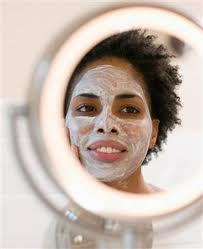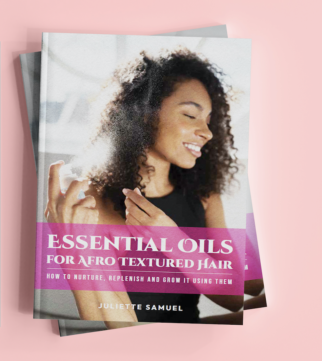 Adding the step of exfoliation to your black skin care regimen is definitely a plus, after all your melanin is part of your beauty.Exfoliation helps remove that dull, ashy, gray appearance that fines its way to the surface of your skin.
Adding the step of exfoliation to your black skin care regimen is definitely a plus, after all your melanin is part of your beauty.Exfoliation helps remove that dull, ashy, gray appearance that fines its way to the surface of your skin.
However, exfoliation can also be a challenge. When you apply pressure that’s too hard to your melanated skin, this is when you will inadvertently scratch your skin, cause a tare and you may not realize this until you’ve finished the process.
When you rinse it off and apply your toner, you’ll feel a tingling at certain parts because it’s going to let you know you have a break in your natural skin.
If you insist on using astringents, which is more alcohol based, you’re going to feel a stinging and tingling once you’ve removed the exfoliating product.
There are Two forms of Exfoliation in Ethnic Skin Care – Mechanical and Chemical
Mechanical exfoliation is the technique of manipulating with your hands using scrubs (St. Ives – Walnut scrub, Peach scrub, Apricot scrub). Make sure they’re used very sparingly.
I would suggest a cream based scrub when it comes to your skin. One with jojoba wax beads is a good choice and will provide your skin with the process of exfoliating but from a gentle standpoint. And you’ll receive the same results as if you were to apply a product that has nuts and shells when using it on your face.
Then you have Chemical exfoliation which don’t include abrasive products like scrubs and brushes.
They involve chemicals like acids and enzymes and within this category is where you’ll find chemical peels. Chemical peels go in, exfoliate your skin from a superficial layer, medium layer or a deeper level of your skin. This is not always the best approach for skin of color because you’re dealing with the melanin which can be effected by the chemicals you’re using on your face.
If a chemical process is something you insist on having or you’re curious about, make sure it’s done under the direction of someone who is trained in Black/Ethnic skin care or skin of color. Make sure they understand melanin and it’s intricacies of how it reacts to products. And make sure they understand what’s necessary and what to do should a challenge arise.
The question here is…
As people of color do we exfoliate enough?
That’s a loaded question because, for the most part, we do not. But then there’s that small percentage that exfoliates on a daily basis, which could be too much. We’re going to talk to both of you, but for those of you who don’t exfoliate enough, it’s going to become one of those steps in your skin care regimen that you’ll add once a week or once every three weeks.
The purpose of exfoliating your skin is to remove the dead skin cells, soften and brighten your skin and maintain the overall health of your skin.
Just as in cleansing, sometimes we have a tendency to over do it. A lot of you who are challenged with acne or dull skin might feel that scrubbing a little hard might be beneficial, but what you’re doing is applying too much pressure, tension and over-stimulating the challenged part of your skin that you’re trying to control.
A lot of you approach exfoliation like you’re scrubbing a pot with a brillo pad, but that’s not what you want to do. You want to be gentle in your approach to exfoliating your skin.
It can be done as gentle as washing your face with a wash cloth or your finger tips, but heavy hands have a tendency to make this simple process more challenging than necessary.
There are some of you who use brushes to exfoliate, which can be a challenge to your skin because it depends on how much pressure or how gentle you are with this particular tool.
I personally don’t like to see you using brushes on your face. The trauma can create problems that are so unnecessary. You forget and go into heavy hand scrubbing mode, not good.
Find balance in your skin care regimen, especially when you get to the step for exfoliating your beautiful black skin.
That’s it for this week, As always …
Dedicated To Your Beauty,
Juliette Samuel
Esthetician/Author/Publisher




 Facebook
Facebook Twitter
Twitter Delicious
Delicious Digg
Digg Myspace
Myspace StumbleUpon
StumbleUpon Youtube
Youtube